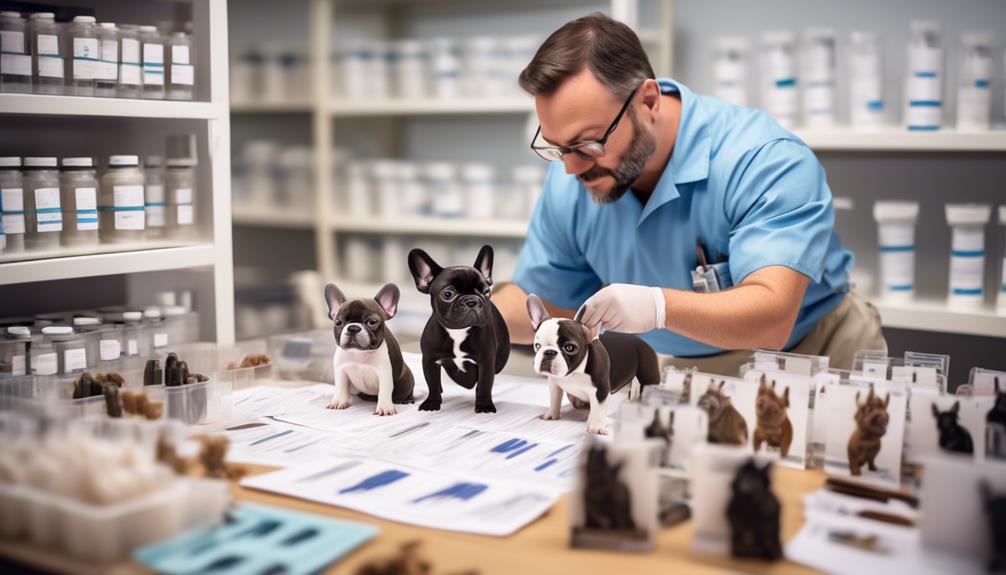3 Best Practices for Responsible French Bulldog Genetic Testing
When it comes to responsible French Bulldog genetic testing, it's crucial to prioritize the health and well-being of these beloved companions. Ensuring that genetic testing is conducted ethically and accurately can greatly impact the long-term health of the breed.
But how do you navigate the complexities of genetic testing to make informed decisions about breeding and healthcare for French Bulldogs? By understanding the three best practices for responsible genetic testing, you can safeguard the health and vitality of this cherished breed while making informed decisions for the future.
Importance of Genetic Testing
Understanding the importance of genetic testing is crucial for ensuring the health and well-being of your French Bulldog. Genetic testing offers numerous benefits for your furry friend. It can help identify potential health issues such as brachycephalic syndrome, a condition common in French Bulldogs due to their short skulls and narrow airways. By knowing your dog's genetic predispositions, you can take preventive measures and provide early intervention, ultimately improving their quality of life. Additionally, genetic testing can help you make informed decisions when breeding your French Bulldog to avoid passing on hereditary diseases to future litters.
However, it's essential to be aware of the limitations and challenges associated with genetic testing. While it can provide valuable insights, it may not cover all possible health concerns. Not all genetic markers for certain conditions may be identified through testing, so it's important to complement genetic testing with regular veterinary check-ups. Moreover, interpreting the results of genetic testing requires expertise, and it's crucial to consult with a qualified veterinarian or genetic counselor to fully understand and act upon the findings.
Despite these challenges, the advantages of genetic testing for your French Bulldog are undeniable. It empowers you to be proactive in managing your dog's health and can contribute to the overall well-being of your beloved pet.
Choosing the Right Testing Methods
To ensure the accuracy of genetic testing for your French Bulldog, it's important to carefully consider and select the most appropriate testing methods. Genetic testing methods for French Bulldogs should be chosen based on the specific health concerns and inheritance patterns associated with the breed. When selecting testing methods, it's crucial to seek guidance from a qualified genetic counselor who can provide expert advice on the most suitable tests for your French Bulldog.
Genetic counseling plays a vital role in helping you understand the inheritance patterns of various genetic conditions in French Bulldogs. A genetic counselor can assist in interpreting test results and provide valuable insights into the likelihood of certain conditions being passed down to future generations. By working with a genetic counselor, you can make informed decisions about which testing methods are most relevant for your French Bulldog.
In addition to genetic counseling, it's essential to consider the inheritance patterns of specific health conditions prevalent in French Bulldogs. For example, brachycephalic syndrome, a condition characterized by respiratory issues, is known to have a genetic component in French Bulldogs. Understanding the inheritance patterns of such conditions can guide the selection of appropriate genetic tests to screen for potential health risks in your French Bulldog.
Understanding Genetic Health Risks
You can identify potential genetic health risks in your French Bulldog by conducting thorough genetic testing and consulting with a qualified genetic counselor. Genetic testing allows you to screen for specific genetic mutations associated with breed-specific diseases, providing valuable insight into your dog's health.
When understanding genetic health risks in French Bulldogs, consider the following key points:
- Comprehensive Genetic Testing: Utilize comprehensive genetic testing to screen for a wide range of breed-specific diseases. This testing can identify mutations associated with conditions such as brachycephalic syndrome, intervertebral disc disease, and hereditary cataracts, among others.
- *Importance of Genetic Counseling*: Seek guidance from a qualified genetic counselor to interpret the results of the genetic tests. Genetic counselors can provide in-depth explanations of the potential health risks identified in your French Bulldog, as well as offer recommendations for managing and addressing these risks.
Working With Certified Veterinarians
Consider consulting with certified veterinarians who specialize in French Bulldog health to ensure comprehensive care for your pet's genetic needs.
When it comes to addressing the genetic health of your French Bulldog, seeking out certified expertise is crucial. Certified veterinarians with a specialization in French Bulldog health are equipped with the knowledge and experience to understand the specific genetic risks associated with this breed. These professionals can provide valuable insights into the best genetic testing options available and offer guidance on how to interpret the results.
Collaborating with a certified veterinarian ensures that your French Bulldog receives the highest standard of care when it comes to genetic testing. These professionals can help you navigate through the multitude of genetic tests available, ensuring that the most relevant and accurate tests are conducted for your pet.
Moreover, they can provide tailored advice based on the specific genetic predispositions of French Bulldogs, helping you to make informed decisions about your pet's health.
Ethical Breeding Practices
Implementing ethical breeding practices ensures the long-term health and well-being of French Bulldogs and contributes to the preservation of the breed's genetic integrity. To maintain responsible breeding ethics and practices, it's important to prioritize the health and temperament of the dogs over appearance or profit.
Here's how you can ensure ethical breeding practices:
- Health Screening:
Regular health screening of breeding French Bulldogs for genetic disorders and hereditary conditions is crucial. This includes tests for hip dysplasia, brachycephalic syndrome, and genetic deafness. Responsible breeders understand the significance of these tests in preventing the transmission of debilitating health issues to future generations.
- Responsible Pairing:
Ethical breeding practices involve carefully selecting mating pairs to avoid exacerbating genetic health problems. Responsible breeders thoroughly research the pedigrees of potential mates, considering not only the individual dogs but also their ancestors. This approach ensures that the breeding pairs aren't likely to produce offspring with genetic disorders.
Interpreting Test Results Accurately
To ensure the long-term health and well-being of French Bulldogs and preserve the breed's genetic integrity, accurately interpreting test results for genetic disorders and hereditary conditions is crucial in maintaining ethical breeding practices. Understanding inheritance patterns plays a pivotal role in interpreting test results accurately.
Genetic disorders can be inherited through various patterns such as autosomal recessive, autosomal dominant, or X-linked recessive. By comprehending these patterns, breeders can better interpret the results and make informed decisions about breeding pairs. For instance, if a genetic disorder follows an autosomal recessive pattern, both parent dogs must carry a copy of the mutated gene for the disorder to manifest in their offspring. This understanding allows breeders to avoid mating two carriers, significantly reducing the risk of passing on the disorder to future generations.
Additionally, utilizing genetic counseling resources can aid in accurately interpreting test results. Genetic counselors can provide valuable insights and guidance based on test results, helping breeders understand the implications for their breeding programs. These professionals can offer detailed explanations of test results, discuss inheritance patterns, and provide recommendations for responsible breeding practices.
Implementing Genetic Testing in Breeding Programs

When incorporating genetic testing into your breeding program, prioritize selecting tests that target prevalent hereditary conditions in French Bulldogs. By doing so, you ensure that the health and wellbeing of the puppies are at the forefront of your breeding efforts.
To further implement genetic testing effectively, consider the following:
- Breeding Standards
Evaluate the breeding standards set by kennel clubs and breed organizations to identify the specific genetic tests recommended for French Bulldogs. Adhering to these standards can help you produce healthier puppies and contribute to the overall betterment of the breed.
- Genetic Counseling
Seek guidance from veterinary geneticists or genetic counselors who specialize in canine genetics. These professionals can provide valuable insights into the interpretation of test results and offer recommendations on breeding strategies to minimize the risk of hereditary diseases in your breeding program.
Incorporating genetic testing into your breeding program not only demonstrates your commitment to responsible breeding practices but also contributes to the long-term health and preservation of the French Bulldog breed. By aligning your breeding efforts with established breeding standards and seeking expert genetic counseling, you can make informed decisions that positively impact the genetic health of future French Bulldog generations.
Ensuring Long-Term Health and Well-being
Prioritize the long-term health and well-being of your French Bulldogs by ensuring that genetic testing is integrated into your breeding program's foundational practices.
Long-term care for French Bulldogs involves proactive health management strategies that start with responsible breeding practices. Beyond genetic testing, it's essential to prioritize long-term health by focusing on preventive care, nutrition, regular exercise, and mental stimulation.
Be proactive in scheduling regular veterinary check-ups to monitor your French Bulldog's overall health and address any potential issues before they become serious. Additionally, stay updated on breed-specific health considerations and educate yourself about common health issues in French Bulldogs to ensure early detection and intervention.
Effective health management also involves understanding your French Bulldog's individual needs and tendencies. Consider factors such as age, activity level, and any specific health concerns that may require tailored care. Implementing a well-rounded wellness plan that includes dental care, parasite prevention, and weight management is crucial for ensuring your French Bulldog's long-term health and well-being.
Remember to prioritize mental well-being as well, providing enrichment activities and socialization opportunities to promote a happy and balanced life for your furry companion.
Frequently Asked Questions
What Are the Potential Costs Associated With Genetic Testing for French Bulldogs?
Genetic testing for French bulldogs can incur costs for initial testing, potential follow-up tests, and breed-specific risks. However, the benefits of accurate results and potential insurance coverage outweigh the costs, making testing frequency essential.
Are There Any Specific Genetic Health Risks That Are More Prevalent in French Bulldogs Compared to Other Dog Breeds?
When considering prevalent genetic risks, French Bulldogs have unique health concerns compared to other breeds. Understanding these comparative breed risks is crucial for responsible breeding and genetic testing to ensure the overall health of French Bulldogs.
How Often Should French Bulldogs Be Re-Tested for Genetic Health Risks as They Age?
You should regularly re-test French Bulldogs for genetic health risks as they age. The prevalence of these risks can change over time, so it's essential to stay proactive in monitoring their health to ensure their well-being.
Can Genetic Testing Help Identify Potential Behavioral or Temperament Issues in French Bulldogs?
Genetic testing can identify potential behavioral or temperament issues in French Bulldogs. It offers benefits such as understanding health risks, complementing re-testing frequency, and providing cost-effective analysis. Consider incorporating it into your responsible breeding practices.
Are There Any Alternative or Complementary Health Practices That Can Be Used in Conjunction With Genetic Testing to Ensure the Overall Well-Being of French Bulldogs?
To ensure the overall well-being of your French Bulldog, holistic care can complement genetic testing. Nutritional supplements, exercise, and regular vet check-ups are important for their health. Always consult with a veterinarian for the best approach.
Conclusion
Now that you understand the importance of responsible French Bulldog genetic testing, it's time to take action.
Choose the right testing methods, work with certified veterinarians, and prioritize ethical breeding practices.
By interpreting test results accurately and implementing genetic testing in your breeding program, you can ensure the long-term health and well-being of your French Bulldogs.
Make responsible genetic testing a priority to promote a healthy and thriving French Bulldog population.
